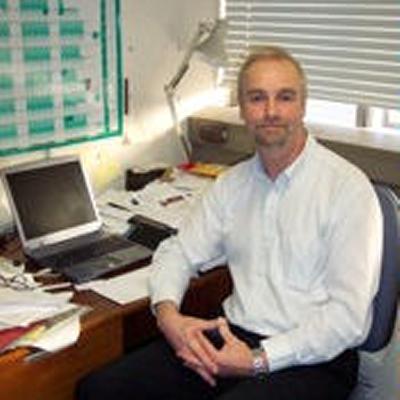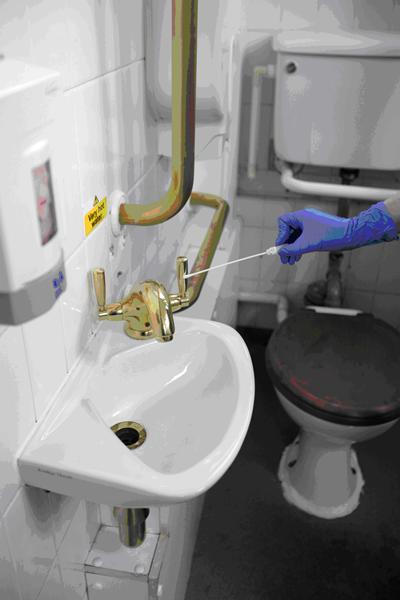On the front line against lethal bacteria

Dispersing some decidedly unwanted communities
Microbiologist Professor Bill Keevil has hit the headlines for his work on how copper can kill off hospital superbugs such as MRSA and Clostridium difficile ( C.diff ). Exchanging steel for copper for surfaces may hold the key to radically reducing numbers of hospital-acquired infections. But this is just the latest in a series of significant findings to emerge from the School of Biological Sciences laboratories where Bill’s researchers are tackling a wide range of microscopic threats to public health.
The smallest forms of life have long fascinated Bill. Much of his career was spent examining bacteria at the Public Health Laboratory, which later became the Health Protection Agency. During more than 20 years working at Porton Down, he became interested in biofilms, communities of bacteria which form on most surfaces in constant contact with water. It all started with research into dental plaque and he won the Colgate prize for work on the bacteria that live inside our mouths.
Bacteria form complex structures in biofilms; one scientific journalist dubbed these surfaces ‘slime city’. They can be found everywhere, from oil pipelines and water coolers to food preparation machines. Biofilms can be difficult to detect, except at microscopic level, and can kill. ‘Often people are only alerted when there’s an outbreak of something unpleasant such as Legionnaire’s disease in a hotel, or an E.-coli infection following poor hygiene in shops or restaurants.’ Chlorine can control the bugs but many types are becoming resistant to this commonly-used cleaning chemical when they survive inside their slimy biofilms.
‘This is a real challenge for scientists. Many infections are becoming resistant to antibiotics as well as substances such as chlorine and we need new weapons in the fight against disease,’ said Bill.
Working with copper has been a major focus of his work for some time. The Copper Development Association partly-funds the research into how solid copper acts on bacteria. The value of copper-based paints has also been examined at Southampton and technician Kirstin Williamson has been employed to work with companies wanting to know more about these developments.

The future is looking promising for increasing the use of copper in hospitals. Trials are underway at a ward in Selly Oak Hospital where frequently-touched surfaces such as door handles, grab rails, bathroom taps and light switches have been replaced with copper alloys.
‘We've already shown that copper surfaces can inactivate MRSA microbes,’ said Bill. ‘The fact that we've now established that copper also acts on C.diff spores, which are resistant to standard cleaning regimes, doubles our conviction that copper can play a significant role in helping hospitals to fight against infections.’
Hospital-acquired infections are a big problem for the NHS and C.diff in particular is resistant to the alcohol gels used in wards to disinfect hands. Latest figures from the National Audit Office and Health Protection Agency show an alarming 72 per cent increase in deaths from the bacteria with numbers rising from 3,757 in 2005 to 6,480 in 2006.
Bill arrived at Boldrewood at the end of 2000 but it wasn't his first encounter with Southampton. He had studied at the University for a post-doctoral award and remembered his time in the laboratories with affection. ‘You get two types of microbiologist. One that dedicates his or her life to the specialist study of one organism and another that takes a more holistic view to work across a broad range of subjects. I'm the second kind of scientist,’ he explained.
Providing the point, current work includes research with SBS colleagues into biofilms on salad leaves involving Hampshire growers Vitacress, working with neurosurgeons and sterile services departments to improve the cleaning of surgical instruments between operations, and interdisciplinary work with Engineering Sciences and Oceanography into tribology, the science of friction, lubrication and wear of all interacting surfaces in relative motion. The University of Southampton has just been awarded £3.26million from the Engineering and Physical Sciences Research Council (EPSRC) to establish a national centre in this field, with Bill providing expertise in antifouling strategies
Yet, despite a lifetime gazing at bacteria, microbiological research hasn’t changed his life. ‘I still eat salads and I still drink water. It’s important to guard against infection but I’m a firm believer in exposing your immune system to a few bugs now and again!’
What's related
Links to external websites
The University cannot accept responsibility for external websites.
[Bacteria in biofilm communities] are a real challenge for scientists. Many infections are becoming resistant to antibiotics as well as substances such as chlorine and we need new weapons in the fight against disease.